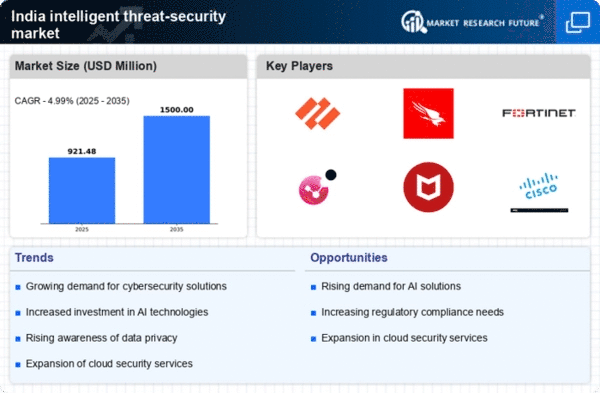Surge in Cyber Threats
The intelligent threat-security market in India is experiencing a surge in demand due to the increasing frequency and sophistication of cyber threats. Reports indicate that cybercrime incidents have escalated by over 30% in recent years, prompting organizations to invest heavily in advanced security solutions. This trend is particularly pronounced in sectors such as finance and healthcare, where sensitive data is at risk. As businesses recognize the potential financial and reputational damage from breaches, the need for robust threat detection and response mechanisms becomes paramount. Consequently, the The intelligent threat-security market is likely to see substantial growth. Companies are seeking to fortify their defenses against evolving cyber threats.
Adoption of Cloud Technologies
The rapid adoption of cloud technologies in India is significantly influencing the intelligent threat-security market. As organizations migrate to cloud-based infrastructures, they face new security challenges that necessitate advanced threat detection and response solutions. According to industry estimates, the cloud security market is projected to grow at a CAGR of 25% over the next five years. This shift compels businesses to integrate intelligent threat-security measures that can effectively protect cloud environments. The increasing reliance on cloud services, coupled with the need for compliance with data protection regulations, is driving investments in intelligent threat-security solutions, thereby expanding the market.
Regulatory Compliance Pressures
Regulatory compliance is becoming a critical driver for the intelligent threat-security market in India. With the introduction of stringent data protection laws, organizations are compelled to enhance their security postures to avoid hefty fines and legal repercussions. The implementation of the Personal Data Protection Bill is expected to create a robust framework for data security, pushing companies to adopt intelligent threat-security solutions. This regulatory landscape is likely to increase the market size as businesses prioritize compliance and invest in technologies that ensure adherence to legal requirements. The intelligent threat-security market is thus positioned to benefit from these compliance pressures.
Rising Awareness of Cybersecurity Risks
There is a notable increase in awareness regarding cybersecurity risks among Indian enterprises, which is driving the intelligent threat-security market. As high-profile data breaches make headlines, organizations are becoming more proactive in addressing their security vulnerabilities. Educational initiatives and government campaigns are further amplifying this awareness, leading to a greater demand for advanced security solutions. Reports suggest that nearly 60% of businesses are now prioritizing cybersecurity in their strategic planning. This heightened awareness is expected to propel investments in intelligent threat-security technologies, thereby fostering market growth.
Increased Investment in Digital Transformation
The ongoing digital transformation across various sectors in India is a significant catalyst for the intelligent threat-security market. As organizations embrace digital technologies, they inadvertently expose themselves to new vulnerabilities. A recent survey indicated that over 70% of Indian companies plan to increase their IT security budgets in response to these challenges. This trend highlights the growing recognition of the need for comprehensive security strategies that incorporate intelligent threat detection and response capabilities. Consequently, the intelligent threat-security market is likely to expand as businesses seek to safeguard their digital assets amidst rapid technological advancements.
















